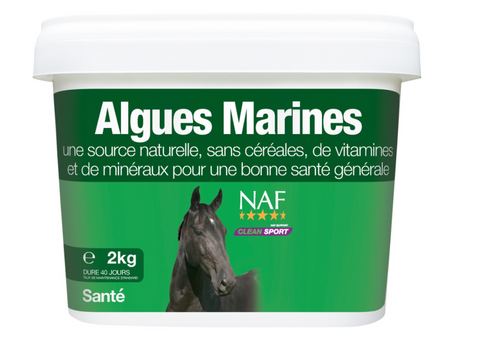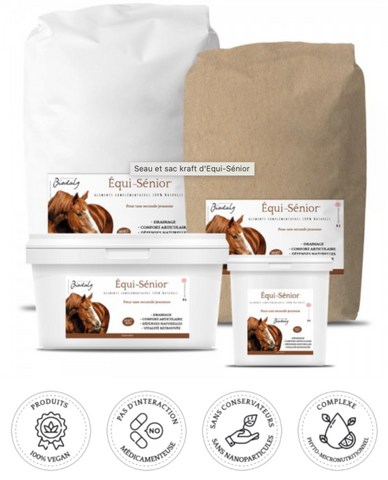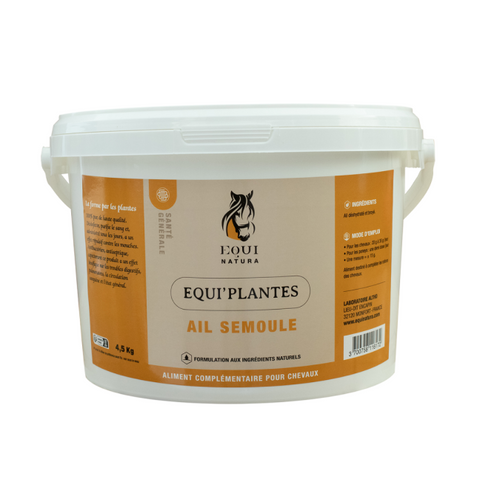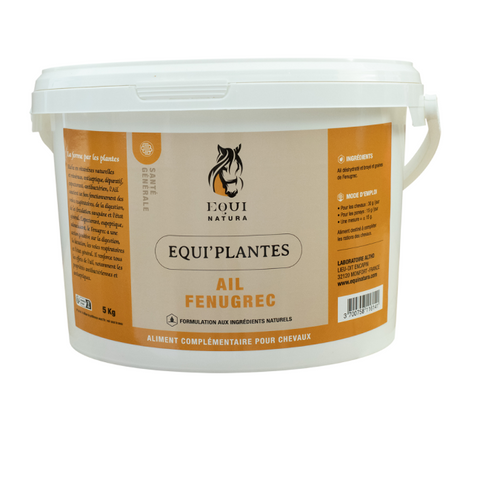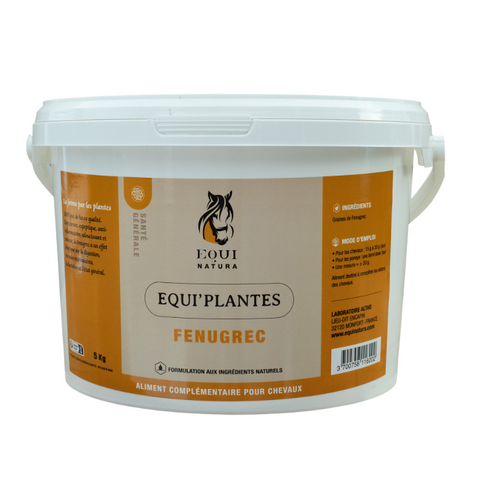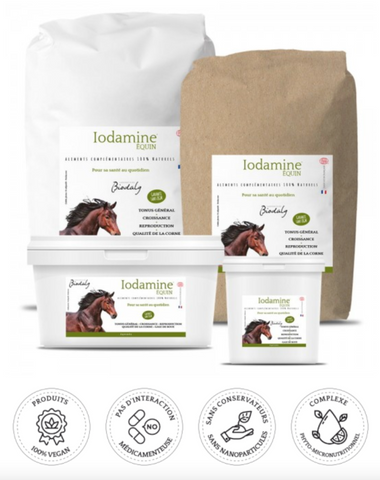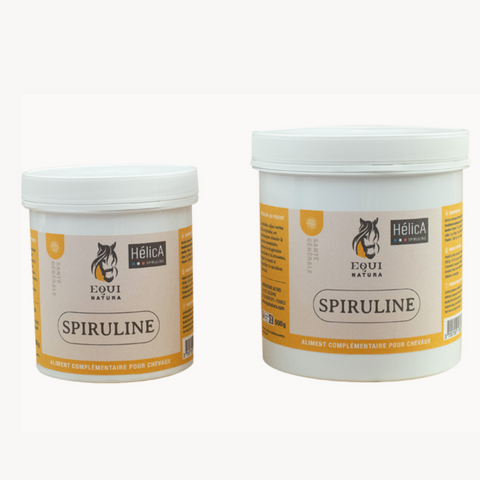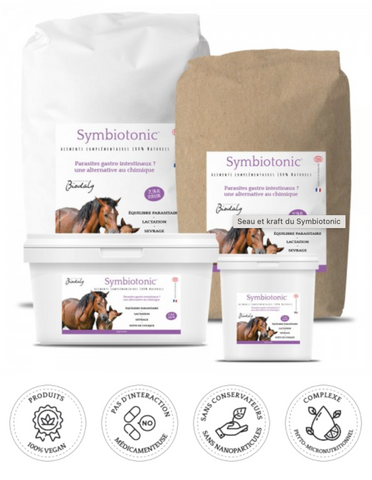Health champions!
Garlic: simple plant or real medicine?
Garlic (allium sativum) has been used universally for a very long time. It has beneficial properties more than any other plant. Numerous studies have demonstrated antiseptic, hypotensive and vasodilator effects on the intestinal and pulmonary sphere as well as fungicidal and expectorant effects. Favorable effects on blood circulation, blood purification, mucus thinning, digestive function and an interesting effect in the fight against worms have been shown. Horses that regularly consume garlic will be less bothered by flies in summer. This will be thanks to the depurative effect and the influence of garlic on body odor. Garlic contains in particular vitamins: A, B1, B3, C, E, choline, minerals: phosphorus, magnesium, potassium, sodium, sulfur, iron, zinc, copper, selenium etc. and important amino acids such as glycine, tryptophan, methionine, lysine.… Equi'plantes Garlic can be administered every day, throughout the year, possibly alternating with Equi'plantes Garlic and Fenugreek (especially in winter).
Fenugreek
Fenugreek (trigonella foenumgraecum) is an herb with a long history. For centuries, man has used it to improve the resistance of horses and cattle.
It is rich in fatty acids, vitamins A, B, C and E, calcium and phosphorus. Equi'plantes Fenugreek has a positive effect on digestion, lactation, the respiratory tract and general fitness. It is eupeptic, anti-inflammatory, softening, tonic, expectorant and also protects the mucous membranes. The combination with garlic is very successful. The two plants complement each other, fenugreek reinforces the antibacterial and disinfectant properties of garlic. Number of customers give Equi'plantes Garlic in summer and Equi'plantes Garlic and Fenugreek in winter.
Marine algae
Seaweed is one of nature's richest products in vitamins, minerals, trace elements and amino acids. They have been harvested for centuries as food for humans and animals.
Algae-Marine is very rich in:
*vitamins: A, B1, B2, B3, B5, B12, C, E, folic acids;
*minerals, including electrolytes: sodium, chloride, potassium and magnesium, essential for water resorption; calcium, to compensate for phospho-calcic imbalances often present in concentrated foods; sulfur, phosphorus;
*trace elements: copper and iron, essential for the formation of red blood cells; iodine, manganese, cobalt, selenium and zinc;
*amino acids: the horse needs ten essential amino acids (amino acids which it does not synthesize).
Marine algae contain these ten amino acids essential for protein synthesis. Lysine is the most important of these amino acids, it is the first to be lacking when the horse's food consists mainly of grains. Without lysine, other amino acids are not used well by the body, which can lead to disruption of various bodily processes.
Seaweed is very useful during difficult moults, promotes the activity of the intestinal flora, improves digestive efficiency and energy metabolism, useful during fatigue and for old horses with a tendency to pica.
Seaweed improves the quality of horn, hair, bones and increases resistance in general.
In the broodmare: be careful during the last 4 months of gestation (except Iodamine Equine , Equi-senior and Symbiotonic ).
The oils
The benefit of administering a little oil in the horse's food has long been underestimated. Essential unsaturated fatty acids are important for the proper functioning of the body, which cannot synthesize them itself. These fats must be provided by food. Essential fatty acids protect cell membranes, tissues, organs, promote intestinal transit and protein absorption. They also increase resistance against infections and give a shiny coat and good hooves. Research has proven a relationship between essential oil deficiency and behavioral problems or lack of concentration.
The most important essential fatty acids are omega 3 (linolenic acid) and omega 6 (linoleic acid).
Omega 3 is a powerful antioxidant and has an anti-inflammatory effect. Omega 6 improves hair quality, fertility, wound healing and joint flexibility.
Oils are a good source of energy; respect the dosage carefully. All the oils offered on our site are high quality, pure, without additives and first cold pressed (no loss of quality).
THE Cider vinegar
Weak organic acid, obtained by fermentation of apples.
A natural health benefit, rich in bioflavonoids (vit.P), vit. A, lives. C, pectins; minerals: calcium, phosphorus, chlorine, sodium, magnesium, sulfur, iron and trace elements. Apple Cider Vinegar is very rich in potassium and can be considered an antioxidant. It is effective on skin problems, it purifies the blood, slows down abnormal calcifications in bones and joints (to be given in cases of arthritis), it regulates digestive pH, balances the intestinal environment, eliminates toxins and combats the harmful effects of insect bites. It will be administered mixed with food or drinking water.
In summer, add a little Apple Cider Vinegar to the shampoo in a bucket of water when you want to wash your horse, this will refresh it and keep flies away.
Garlic (allium sativum) has been used universally for a very long time. It has beneficial properties more than any other plant. Numerous studies have demonstrated antiseptic, hypotensive and vasodilator effects on the intestinal and pulmonary sphere as well as fungicidal and expectorant effects. Favorable effects on blood circulation, blood purification, mucus thinning, digestive function and an interesting effect in the fight against worms have been shown. Horses that regularly consume garlic will be less bothered by flies in summer. This will be thanks to the depurative effect and the influence of garlic on body odor. Garlic contains in particular vitamins: A, B1, B3, C, E, choline, minerals: phosphorus, magnesium, potassium, sodium, sulfur, iron, zinc, copper, selenium etc. and important amino acids such as glycine, tryptophan, methionine, lysine.… Equi'plantes Garlic can be administered every day, throughout the year, possibly alternating with Equi'plantes Garlic and Fenugreek (especially in winter).
Fenugreek
Fenugreek (trigonella foenumgraecum) is an herb with a long history. For centuries, man has used it to improve the resistance of horses and cattle.
It is rich in fatty acids, vitamins A, B, C and E, calcium and phosphorus. Equi'plantes Fenugreek has a positive effect on digestion, lactation, the respiratory tract and general fitness. It is eupeptic, anti-inflammatory, softening, tonic, expectorant and also protects the mucous membranes. The combination with garlic is very successful. The two plants complement each other, fenugreek reinforces the antibacterial and disinfectant properties of garlic. Number of customers give Equi'plantes Garlic in summer and Equi'plantes Garlic and Fenugreek in winter.
Marine algae
Seaweed is one of nature's richest products in vitamins, minerals, trace elements and amino acids. They have been harvested for centuries as food for humans and animals.
Algae-Marine is very rich in:
*vitamins: A, B1, B2, B3, B5, B12, C, E, folic acids;
*minerals, including electrolytes: sodium, chloride, potassium and magnesium, essential for water resorption; calcium, to compensate for phospho-calcic imbalances often present in concentrated foods; sulfur, phosphorus;
*trace elements: copper and iron, essential for the formation of red blood cells; iodine, manganese, cobalt, selenium and zinc;
*amino acids: the horse needs ten essential amino acids (amino acids which it does not synthesize).
Marine algae contain these ten amino acids essential for protein synthesis. Lysine is the most important of these amino acids, it is the first to be lacking when the horse's food consists mainly of grains. Without lysine, other amino acids are not used well by the body, which can lead to disruption of various bodily processes.
Seaweed is very useful during difficult moults, promotes the activity of the intestinal flora, improves digestive efficiency and energy metabolism, useful during fatigue and for old horses with a tendency to pica.
Seaweed improves the quality of horn, hair, bones and increases resistance in general.
In the broodmare: be careful during the last 4 months of gestation (except Iodamine Equine , Equi-senior and Symbiotonic ).
The oils
The benefit of administering a little oil in the horse's food has long been underestimated. Essential unsaturated fatty acids are important for the proper functioning of the body, which cannot synthesize them itself. These fats must be provided by food. Essential fatty acids protect cell membranes, tissues, organs, promote intestinal transit and protein absorption. They also increase resistance against infections and give a shiny coat and good hooves. Research has proven a relationship between essential oil deficiency and behavioral problems or lack of concentration.
The most important essential fatty acids are omega 3 (linolenic acid) and omega 6 (linoleic acid).
Omega 3 is a powerful antioxidant and has an anti-inflammatory effect. Omega 6 improves hair quality, fertility, wound healing and joint flexibility.
Oils are a good source of energy; respect the dosage carefully. All the oils offered on our site are high quality, pure, without additives and first cold pressed (no loss of quality).
THE Cider vinegar
Weak organic acid, obtained by fermentation of apples.
A natural health benefit, rich in bioflavonoids (vit.P), vit. A, lives. C, pectins; minerals: calcium, phosphorus, chlorine, sodium, magnesium, sulfur, iron and trace elements. Apple Cider Vinegar is very rich in potassium and can be considered an antioxidant. It is effective on skin problems, it purifies the blood, slows down abnormal calcifications in bones and joints (to be given in cases of arthritis), it regulates digestive pH, balances the intestinal environment, eliminates toxins and combats the harmful effects of insect bites. It will be administered mixed with food or drinking water.
In summer, add a little Apple Cider Vinegar to the shampoo in a bucket of water when you want to wash your horse, this will refresh it and keep flies away.

